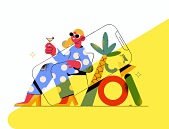 It is a long established fact that a reader will be distracted by the readable content of a page when looking at its layout. H.G. Wells made the famous statement that “advertising is a legalized form of lying”. While many people argue that advertisers exploit the emotions of people, nothing could be farther from the truth.
It is a long established fact that a reader will be distracted by the readable content of a page when looking at its layout. H.G. Wells made the famous statement that “advertising is a legalized form of lying”. While many people argue that advertisers exploit the emotions of people, nothing could be farther from the truth.Advertising is for the promotion of goods and services, but advertising is not an industry known for its honesty something we have all grown to accept. We know that most washing powders do not wash whiter than white, but instead makes your laundry pretty much the same shade of grey after a while,
Sadly none of this really bothers us anymore, we have become immune and just accept it as the rules of the game. Unfortunately advertisers have taken this acceptance as permission to go even further, so perhaps it is time to draw a line in the sand and create advertising standards.
 The positivity and possibilities that we can create through changing things has become especially problematic with the rise of platforms like Facebook and Twitter, with companies pushing to get you to “Friend” them, or even worse, become a “Follower”. People just want to pay money for goods and services without joining a revolutionary cell or brainwashing cult.
The positivity and possibilities that we can create through changing things has become especially problematic with the rise of platforms like Facebook and Twitter, with companies pushing to get you to “Friend” them, or even worse, become a “Follower”. People just want to pay money for goods and services without joining a revolutionary cell or brainwashing cult.Today, with social media the way it is, each of us is a now a tiny, unpaid ad executive, helping to ensure that the latest trailers or even mildly amusing yogurt adverts are spread far and wide. The problem being how much is true and based on facts, and how much is false news being passed on and elaborated a little along the way. It could be said that advertising is legalised lying, so where does one draw the line, where does erotic art become pornography?
